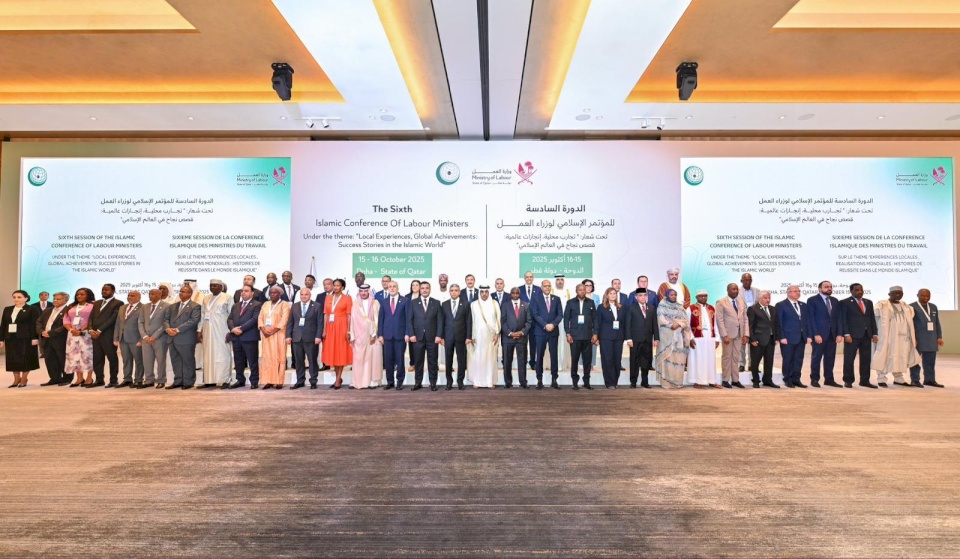
Conclusion of the 6th Islamic Conference of Ministers of Labour in Doha
SadaNews Economy - The 6th Islamic Conference of Ministers of Labour from the member states of the Organization of Islamic Cooperation concluded today in the Qatari capital, Doha. The conference was held over two days, October 15 and 16, under the theme: "Local Experiences, Global Achievements: Success Stories in the Islamic World," with the participation of labour ministers and representatives from more than fifty Islamic countries, as well as several international and regional organizations, experts, academics, and representatives of civil society institutions.
Palestine was represented at the conference by Ambassador Faiz Abu Rubb, the Ambassador of the State of Palestine to the sisterly State of Qatar, on behalf of Her Excellency Minister of Labour Dr. Inas Al-Attar, who was accompanied by Senior Advisor Khouloud Al-Lahham and Ms. Hanaa Sawali from the Embassy of the State of Palestine in Doha.
Throughout its sessions, the conference discussed the most important issues and challenges related to developing labour markets in Islamic countries, enhancing employment and social protection, skill development, capacity building, and digital transformation, in line with sustainable development goals and empowering various community groups.
In the conference's final statement, the ministers emphasized the importance of enhancing bilateral and multilateral cooperation between member states, the Organization of Islamic Cooperation, and the Islamic Development Bank with the State of Palestine, to provide the necessary support in the areas of employment, job creation, entrepreneurial projects, and small and medium enterprises. They also supported the Palestinian Employment Fund to contribute to providing decent job opportunities for the unemployed, especially youth, women, and people with disabilities. This effort aims to alleviate the high unemployment rate, which has exceeded 52% due to the Israeli aggression, and to enhance the Palestinian people's resilience and economic recovery.
Additionally, the ministers and heads of delegations condemned the ongoing humanitarian crisis and economic disaster in the Gaza Strip, which has devastating effects on the labour market, employment prospects, and livelihoods in the occupied Palestinian territories, noting the loss of more than 60% of job opportunities and affirming that this constitutes a crime against humanity and a flagrant violation of international law.
The participants called for supporting efforts to establish an independent State of Palestine on the borders of June 4, 1967, with East Jerusalem as its capital, emphasizing the need to hold Israel accountable for its crimes against the Palestinian people.
The statement stressed the urgent need to develop a comprehensive Islamic strategy to support Palestinian employment and rebuild the Palestinian national economy by providing job opportunities, enhancing social protection, and empowering affected families, ensuring dignified and sustainable livelihoods for the Palestinian people, as this is an essential part of the development and recovery agenda in the Islamic world.
The conference also reaffirmed support for the right of the State of Palestine to obtain full membership in the International Labour Organization and to enable it to participate effectively in various international and global organizations, embodying the international commitment to implement the two-state solution and relevant United Nations resolutions.
The conference witnessed the signing of the charter of the Labour Centre affiliated with the Organization of Islamic Cooperation, with the State of Palestine being among the countries that signed and ratified the charter earlier.
The conference's Bureau was elected by acclamation, with the State of Qatar presiding over the 6th session, and the Republic of Indonesia, the Republic of Guinea-Bissau, and the State of Palestine serving as vice presidents, while the Republic of Azerbaijan undertook the duties of the general rapporteur.
At the conclusion of the conference, the ministers and heads of delegations expressed their appreciation to the State of Qatar for its successful hosting and excellent organization of the 6th Islamic Conference of Ministers of Labour, praising its leading role in supporting development and labour issues in the Islamic world, and its firm positions in support of the Palestinian cause and the legitimate rights of the Palestinian people.
The ministers reaffirmed their commitment to continue coordination and cooperation within the framework of the Organization of Islamic Cooperation to achieve decent work and sustainable development in member states.

Bin Ghati: We Currently Rule Out An IPO, Planning Expansion in Abu Dhabi and London

Saudi Sovereign Fund Raises Two Billion Dollars from International Sukuk Offering Amid Str...

S&P: Davos Assumptions for Electricity Supplies Until 2029 are "Impossible"

Oil Prices Stabilize as Geopolitical Tensions Over Greenland Ease

Gold Prices Reach Nearly $4,826 an Ounce

Silver Supplies Heading for Greater Scarcity Amid Increased Demand from Individuals and Ex...

What are the most dangerous challenges facing the global economy?
